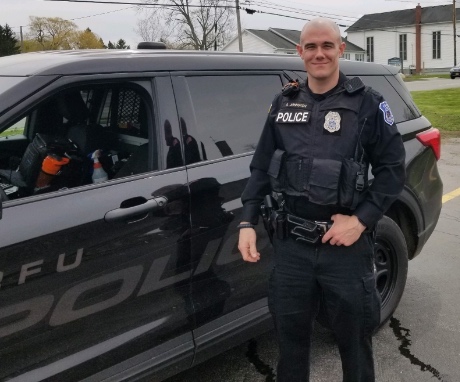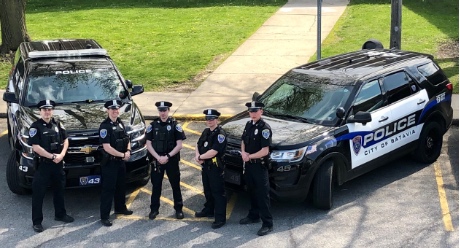Long Island native Weldon Ervin is counting on a change of scenery and the love of his young family to permanently put a decade of criminal activity and confusion in the rear view mirror.
Ervin, 28, is a resident of the Village of Le Roy now, living at the home of the Bianchi family. He and his girlfriend, Chelsea Bianchi, have two children together -- 2-year-old son, Nicola (Nico, for short), and 1-year-old daughter, Alani.
He is a black man in a rural community with a minority population of 1.7 percent – a far cry from the diverse mix that he encountered growing up in the shadow of New York City.
He also is a participant on the Le Roy Police Reform and Reinvention Collaborative, a 15-member committee formed in compliance with Gov. Andrew Cuomo’s Executive Order No. 203, accepting the invitation of Police Chief Chris Hayward, whom he considers a close friend.
Hayward got to know Ervin through his relationship with Bianchi’s parents – his longtime neighbors – and believed that Ervin’s life experience would enhance the group’s discussion and help shape the reform plan that has to be submitted to New York State by April 1.
Chief: Ervin Would Be An Ideal Candidate
“Being a small community, it’s not your exposure to law enforcement, I guess, that people of color deal with in larger communities,” Hayward said. “And Weldon being from Long Island has had some experience with law enforcement and also the criminal justice system, so that’s why I felt that he would be an ideal candidate to be on the reform committee to give his insight on some important issues.”
The governor’s mandate requires municipal police agencies to review policies and procedures, and adopt a plan that addresses, “the particular needs of the communities served by such police agency and promote community engagement to foster trust, fairness, and legitimacy, and to address any racial bias and disproportionate policing of communities of color.”
The Le Roy committee’s next meeting is scheduled for this Tuesday.
The Batavian sat down with Ervin and Hayward at Le Roy Village Hall last week to talk about the former’s life experiences and, more importantly, what he has learned from those experiences.
Without question, Ervin’s road to Le Roy was a rocky one, marred by short stints and long stays in penal institutions in New York City, Long Island, and the counties of Westchester, Greene and Seneca. All told, he spent 10 years behind bars – not all at once, but in and out due, in part, to prescription drug addiction, a troubled childhood and a rebellious attitude.
He became entrenched in the criminal justice system and, after more trials and tribulations, his time on parole ended and he found his way to what is proving to be a more serene existence in the Genesee Region.
Growing Up Without His Father
“I was born in Hempstead, Long Island, and I just found that out when I saw my birth certificate recently and then we relocated to Far Rockaway, Queens,” said Ervin, who with his three brothers was raised by his mother. “My dad (Weldon Ervin Sr.) wasn’t really in my life.”
With no father in the home, that put a lot of pressure on his mom to raise Ervin, his brother, Cedric, 27, and stepbrothers, Norell, 19, and Avery, 14. And being the oldest, much of the duties of caring for the younger siblings fell upon Weldon, who had was dealing with other issues.
“I saw a lot of anger in my mom; the strife toward my dad was taken out on me,” he said. “There was a little abuse growing up, from what I can remember it was physical, verbal and emotional. I still love my mother and I can’t hold it against her. She made sure we were in the right schools and had good clothes.”
Ervin said his mom was an excellent athlete, competing in basketball, soccer and volleyball, and she instilled that love of sports into him.
“My mom taught us the fundamentals of things,” he said. “We went to sports camps. My favorite sport is baseball, then basketball and then football. My late grandfather loved baseball. We used to go to his house every Saturday and Sunday. He would teach us how to play baseball and things that we could shape the game of baseball in our own way.”
Mom Sacrificed For Her Children
Ervin said his mother, who lives in Long Island, sacrificed a lot for her him and his brothers, sending Ervin to Bethel Christian Academy in Jamaica, Queens, from first through eighth grade – and working three jobs in order to cover the bill.
“My mom was a social worker – still is – working at an all-female group home, and we took the bus – and it was tiring. I remember one time seeing the tuition and it was $5,200. I was, like, wow. Certain times she said we couldn’t go to school for a day or so, and I guess that was because she needed time to get the money to pay the tuition,” he said.
Ervin said he didn’t have much of a relationship with his stepfather and had to learn how to gauge the mood of his mother to avoid confrontation.
“He tried, but I really didn’t let him in. Growing up from the abuse, when you come home from playing outside and then you’re like, I had to analyze my mom to see what kinds of day she was having because that would predict would kind of night I would have,” he said. “I had to come into the house and just watch my mom. She would read her Bible, and I would say, all right, she’s done this before. I know how she would act and I know when something was troubling her.”
He said it was tough on him to watch after his brothers while his mother worked the third shift.
“I was the caretaker of my brothers. When they woke up, they’re asking me, ‘Where is mommy?’ I’d say, ‘Mommy’s at work. You want some chips?’ We would eat chips and watch TV.”
Prescription Drugs Take Their Toll
The grind took its toll on Ervin and soon he was seeing a psychiatrist and taking Klonopin to help him behave in school. “My mom should have taken the initiative and said no (to this),” he said. He was 12 or 13 years old at the time.
From there, he was prescribed Xanax as he entered Lawrence High School on Long Island, thrusting him into an environment of different races and opportunities.
“It was just different. It was very diverse. You had 30-percent black, 30-percent white, 30-percent Spanish and 10-percent miscellaneous. I said, this is all right,” he recalled.
Before long, however, he had hooked up with a classmate and he was selling some of his Xanax pills.
“We spoke business. But I didn’t know any different. I figured I didn’t need this much – here. Money. Thank you,” he said.
Soon thereafter, at the age of 16, he had his first encounter with the law.
One of his friends stole some guns from another friend’s house and was arrested. A week later, after being implicated by one of the others, Ervin was charged with third-degree burglary, a Class C felony.
“I told them that I didn’t have any guns and I didn’t sell any. (But) I was there and now I was a part of it,” he said.
Jail Time And Placed On Probation
He received a jail sentence of six months and was put on probation for five years. Thanks to a letter from a school counselor, he served only 20 days.
That was just the beginning of Ervin’s legal problems, however.
While on probation – and in the throes of his Xanax addiction – he stole something from the church where he attended in Far Rockaway, but said he doesn’t remember it.
“I then was sent to Rikers Island (an island in the East River between Queens and the Bronx that is home to New York City's main jail complex),” he said.
Hayward was quick to interject: “That’s not a good place.”
Ervin’s lawyer got him out due to his drug addiction and the 17-year-old was sent to a program at Phoenix House in Westchester County.
“I was a follower back then,” he said. “When I got to Phoenix House, I began to sell cigarettes. I didn’t smoke cigarettes, so it was all profit. With my frequent court and probation appearances, I was able to bring cigarettes and tobacco back (into the rehab center).”
Failing to focus on his recovery or school, Ervin said he rebelled and just thought about getting back on the street. He ended up being kicked out of the program after three months.
His Anger Would ‘Go Through The Roof’
All the while, he increased the amount of Xanax he was taking in an effort to control his rage.
“If I couldn’t get my Xanax, my anger would go through the roof,” he said, recalling that he slapped one of his brothers for drinking his grape juice.
In January 2010, Ervin was charged with grand larceny and ended up serving 13 months in Nassau County Jail, and after that, an incident involving an MS-13 gang member resulted in a 22-month stay at Coxsackie Correctional Facility in Greene County.
Ervin’s account of the latter situation indicated that he was in the wrong place at the wrong time.
“One day, one night, me and my friend were walking with his girl and his cousin,” he said. “In that area, a lot of Hispanics don’t get along with blacks and there’s a lot of MS-13 down there. We’re walking and we see them. I don’t have any problems with these people. I am not the kind of person who beats people up.”
He said the MS-13 guy “acts like he has something concealed, but he’s just a poser. My boy runs to him – says I can take everything from you right now -- and the guy takes off running.”
As it turned out, the MS-13 member accused them of stealing from him and brandishing a 12-inch kitchen knife, and Ervin was charged with several counts related to robbery and attempted robbery.
Ervin, then 19, was placed in a lineup, went to trial and was found guilty of second-degree attempted robbery and sentenced to three and a half years at Coxsackie Correctional Facility. He served 22 months.
Obtaining His GED While Behind Bars
While in Nassau County Jail, Ervin obtained his GED (General Education Development certification) and he served as a teacher’s assistant at Greene.
“I was just doing it to stay sharp in the books, and I also started working out and got a job in the rec yard to work out more. In the winter, I got a job in the gym to keep my mind off of everything,” he said.
His jail time wasn’t over, however, as he was incarcerated on and off over the past six years for parole violations, serving time at Willard Drug Treatment Facility in the Town of Romulus, Seneca County and, lastly, in Nassau County.
“Last year was my first birthday since I was 19 that I was home for my birthday,” he said, adding that his final day in jail was June 17 of this year.
After meeting Chelsea in 2017 through a friend of a friend, he said, he attempted to switch his parole to this area, hoping to live with her in an apartment in Perry. Although the landlord was fine with it, the parole board had different ideas.
“When you transfer, they would have to tell you (the person that I would be staying with) my record,” he said. “So, they told her this and that, and she said, ‘that’s all right.’ But they just basically said no.”
Problems With The Parole Board
Ervin said the parole officer tried to change Chelsea’s mind and they eventually convinced the landlord that he was “this horrible person.” His plan to live in Perry fell through.
According to Hayward, a parole board’s handling of these situations is part of the problem.
“Once these folks get into the criminal justice system, I sometimes don’t think there is the desire on the part of parole or other persons to want to get them out,” he said. “It’s been my experience for as long as I have been a cop, that once somebody gets in the criminal justice system, pretty much they stay there because of stuff like this. They want to keep them in that system and not give them the opportunity to make things better.”
Hayward said it is a systemic issue, but he doesn’t believe it is assigned to any specific race.
Ervin said he thinks the parole board doesn’t take the initiative to look at how a person has progressed when they evaluate placement.
“It’s your job to help my get back into the community as a human being and help me understand that this is the right way to live,” he said. “If you looked at my record, you’ve seen that everything happened in Long Island. Why wouldn’t you want me to come up here? Is it because of my race? Is he going to cause problems? Or, you know what, we can give him a chance; maybe this can help him.”
Hayward said he was rebuffed by the parole officer when he tried to help Ervin get a transfer to this area.
“When they were trying to get him up here, I actually spoke with the parole officer who was doing the investigation and it was not a positive conversation at all. I really was taken aback by it,” he said. “I’ve known Chelsea’s parents for quite some time, we’ve been neighbors for about 20 years. They’re good, solid people, and that’s where Weldon was going to be living.”
Happy To Live A ‘Boring Life’
Ervin admitted that he was a persistent parole violator, but is excited to report that his time on parole is over, he’s not on any mandated programs and he’s happy to live what Hayward called “a boring life” with Chelsea, who is studying to be a nurse, and the children in Le Roy.
When asked if he still is on medication, Ervin said he takes something to help him sleep at times, but that “my kids are my addiction now.”
“My anxiety, I deal with it. My kids are my support … even if I have a thought of something, it will never turn into action,” he said. “If I have a thought, ‘I wonder what’s going on in Long Island?’ it doesn’t matter because I will be having to dodge a toy thrown by Nico, and say, ‘OK, I’m not going to Long Island.’ ”
He said he understands his role on the Le Roy Police Reform Collaborative and seeks to share his input and what he has been through to committee members and the general public who may not be aware of some aspects of the criminal justice system.
“I’ve lost time that I can’t get back, but to be on this committee is a good opportunity. It’s my experience. It is my story and I feel like if my experience can help someone else or someone else can see that this place is a very good place compared to other places, then I think that can be very beneficial.”
Ervin spoke about the next generation and the importance of teaching them and the need to “keep evolving and evolving.”
Surprised To Hear About Le Roy’s SRO
He said he was surprised to learn that Le Roy Central District has a school resource officer (Sean Ancker) who interacts with students in a positive way.
“And he’s not dressed like a cop,” he said. “When I would go to school, I would see cops in vests – kids were getting put on a wall and being searched because maybe they had a button on their jeans and it (metal detector) kept ringing. It’s not welcoming because that was the first thing you’d see when you went to school. That creates fear.”
Hayward said Ervin has demonstrated that he wants to be a good father and role model.
“What happened in the past needs to be in the past. And he doesn’t need me as a police officer or anybody else in law enforcement to be constantly reminding him of his past. I am going to judge him for who he is now and not for what he was then,” he said.
The chief said children aren’t born not liking blacks or not liking whites, and said it is up to the parents to set them on the proper course.
“My granddaughters come up and visit, and go out – and when my youngest granddaughter goes out and talks to Nico out in the backyard, she’s not looking at him as a little black boy, she’s looking at another little boy her age. And that’s how it is supposed to be.”
Ervin said he has made some new friends -- they are Chelsea’s friends – but does keep tabs on friends in Long Island through social media.
He said that after years of hustling, scheming and fighting, he’s managed to find peace in his life.
“I just came to the realization that what I was doing in the past wasn’t working,” he said. “Where I was at is not it. But I am proud in that through my upbringing and the abuse and the Xanax, I have been able to become the man who I am. I’m sure someone can relate to my story … I’m not alone. Hopefully, my story can help somebody else.”
Photo: Weldon Ervin, left; Le Roy Police Chief Chris Hayward and Le Roy Police Sgt. Greg Kellogg. Photo by Mike Pettinella.










